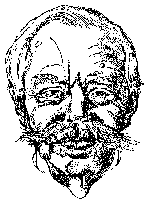
Jakob Johann von Uexküll was born in Keblaste (now Mihkli), Estonia, in September 8, 1864, and died on the island of Capri in July 25, 1944.
He studied zoology in the University of Tartu (then Dorpat), Estonia, in 1884-89. After this, he worked at the Institute of Physiology of the University of Heidelberg (in the group of Wilhelm Kühne (1837-1900), who was the editor-in-chief of the leading European biological journal Zeitschrift für Biologie, and the author of the notion enzyme), and at the Zoological Station in Naples. In 1907 he was given an honorary doctorate by the University of Heidelberg for his studies in the field of muscular physiology. One of his results of these years became known as Uexküll's law, which is probably one of the first formulations of the principle of negative feedback occurring inside an organism.
His later work was devoted to the problem of how living beings subjectively perceive their environment and how this perception determines their behaviour. In the book Umwelt und Innenwelt der Tiere (1909) he introduced the term Umwelt to denote the subjective world of organism. This is the notion according to which Uexkull is most frequently cited in the contemporary literature. Uexküll developed a specific method which he termed 'Umwelt-research'. In 1926 Uexküll founded the Institut für Umweltforschung at the University of Hamburg.
Between 1927 and 1939, Uexküll spent his summers with his family at Puhtu peninsula (western coast of Estonia) in his summer cottage (since 1949, this is Puhtu Biological Station of the Institute of Zoology and Botany, Tartu, Estonia).
Uexküll's field of research was the behaviour of living organisms and their interaction as cells and organs in the body or as subjects within families, groups, and communities. He is recognised as one of the founders of behavioural physiology and ethology, and a forerunner of biocybernetics.
Of particular interest to Uexküll was the fact that signs and meanings are of prime importance in all aspects of life processes. His concept of functional circle (Funktionskreis) can be interpreted as a general model of sign processes (semiosis).
Uexküll considered himself a follower of Johannes Müller (1801-1858) and Karl Ernst von Baer (1792-1876). His philosophical views were based on the works of I.Kant.
Uexküll wrote one of the first monographs on theoretical biology (Theoretische Biologie, 1920, 1928). The fields in which his work made a remarkable contribution include the comparative physiology of invertebrates, comparative psychology, philosophy of biology.
He is recognised as the founder of biosemiotics (Bedeutungslehre, 1940).
